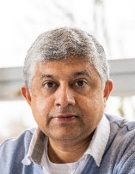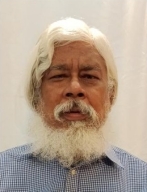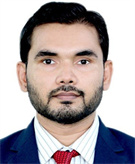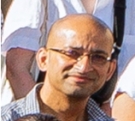
Keynote Speaker

Prof. Ming Chen
Zhejiang University, China
Biography: Prof. Ming Chen received his PhD in Bioinformatics from Bielefeld University, Germany. He is a professor and PhD supervisor at the college of Life Sciences in Zhejiang University, and is the leading figure in the field of Bioinformatics at Zhejiang University. He has a long career in scientific research and education of bioinformatics and systems biology. He has published over 200 SCI academic papers in journals such as Cell, Nature, Nucleic Acids Research, and Bioinformatics, and his google scholar H-index is over 51. Prof. Ming Chen is the President of the Bioinformatics Society of Zhejiang Province, China; Committee Director of Chinese Society for "Multi-Omics and Integrative Biology", Committee Deputy Director of Chinese Society for "Modeling and Simulation of Biological Systems"; Committee executive member of Chinese Societies for "Computational Systems Biology" and "Functional Genomics & Systems Biology"; and Committee member of Chinese Societies for "Biomedical Information Technology" and "Biophysics (Bioinformatics) ".

Prof. Qihua Tan
University of Southern Denmark, Denmark
Dr. Qihua Tan is a professor of genetic epidemiology at Institute of Public Health and Institute of Clinical Research, University of Southern Denmark. Professor Tan’s research area involves twin modelling, bioinformatics, genetics, epigenetics, biodemography as well as their applications in public health with a focus on human aging and development and in clinical medicine such as cancer, diabetes, asthma etc. He has also established a strong network of international collaboration on twin analysis, genetic and epigenetic studies on aging and metabolic health. Professor Tan has published over 250 articles in internationally peer reviewed journals among which about half as first author or last (corresponding) authors.
Speech Title: "Identification of Differentially Methylated Genomic Regions in Women with Polycystic Ovary Syndrome"
Abstract: Recent genome and epigenome-wide association studies on polycystic ovarian syndrome (PCOS) have revealed important mutations and DNA methylation sites significantly associated with or differentially regulated by the condition. Given the fact that the single-variant association testing is prone to false discoveries, we performed a genomic region-based association testing to identify multiple methylation sites jointly regulated in a region-specific manner. Genome-wide DNA methylation data were collected on 173 women of reproductive age with 84 PCOS cases and 89 healthy controls. Our analysis discovered 1810 genomic regions under differential methylation in PCOS women (adjusted p<0.05). The detected regions are predominantly hypomethylated in PCOS cases suggesting up-regulated expression activities in genes located in the regions. Functional annotation of the significant regions identified nine biological pathways enriched in the regulatory domain of the genome, including hypoxia, mitotic spindle, p53 signaling, androgen response which have been reported to involve in PCOS pathogenesis, and other novel pathways for further investigation. In sum, our region-based epigenetic association analysis points to the epigenetic basis in PCOS development by revealing genomic regions and related genes for functional interpretation as well as for potential intervention to promote reproductive health.

Prof. Dr. G.V. Shivashankar
ETH Zurich and Paul Scherrer Institute, Switzerland
Shivashankar is currently a Full Professor of Mechano-Genomics at the Department of Health Science and Technology, ETH Zurich jointly with the Paul Scherrer Institute, Switzerland. He carried out his PhD at the Rockefeller University (1994-1999) and Postdoctoral research at NEC Research Institute, Princeton USA (1999-2000). He was a tenured faculty at the National Center for Biological Sciences, NCBS-TIFR- Bangalore, India (2000-2009) before relocating to the National University of Singapore (NUS) in 2010. He was the Deputy Director of the Mechanobiology Institute at NUS (2011-2019) and was the IFOM-NUS Chair Professor (2014-2019) before joining ETH. His scientific awards include the Birla Science Prize in 2006, the Swarnajayanthi Fellowship in 2007. He was elected to the Indian Academy of Sciences in 2010 and to the EMBO membership in 2019.
Speech Title: "AI-based Chromatin Imaging Biomarkers in Health and Disease"
Abstract: Alterations in nuclear and chromatin organization are hallmarks of cellular aging and many aging related diseases including cancer and neurodegeneration. However, quantitative methods to analyse subtle alterations in chromatin states to understand cell-state transitions and for early disease diagnostics are still missing. In this talk, I will first describe our AI-based chromatin imaging biomarker platform. I will then demonstrate the sensitivity of this platform to trace tumour progression and neurodegeneration using tissue biopsies. Furthermore, I will describe our ongoing clinical trials, using AI-based chromatin biomarkers in blood biopsies, for early disease diagnostics and for tracing the efficacy of therapeutic interventions in personalized and precision medicine. Finally, I will introduce a major global public health project that we have initiated to develop a chromatin imaging atlas of human blood cells in health and disease.

Prof. Jan Komorowski
Uppsala University, Sweden
Dr. Jan Komorowski is Senior Professor
of Bioinformatics at the Department of Cell and Molecular Biology at
Uppsala University, Sweden, Visiting Professor at the Institute of
Computer Science, PAS, Warszawa, Poland, and Affiliate Faculty at
Washington National Primate Research Center, Seattle, WA, USA. He
came to Bioinformatics after a successful career in Computer
Science. His PhD work on partial evaluation of logic programs is
cited to the day, 40 years after the publication. Since mid-90’s Dr.
Komorowski’s main research interest is interpretable machine
learning for Life Sciences. At the center of his work are models of
complex regulatory mechanisms as they change in response to genetic
and environmental factors developed from transcriptome data,
mutation and DNA modification data, metabolomics, screening and
clinical data in the context of cancer, diabetes and viral diseases.
Dr. Komorowski has published in Nature, Nature Genetics, Nature
Communications, Genome Research, Nucleic Acid Research,
Bioinformatics and several other international journals.
https://scholar.google.se/citations?user=P6CBNTMAAAAJ&hl=en.
Dr. Komorowski obtained an MSc in Computer Science at University of
Warsaw in 1976 and in 1981 he earned a PhD in Computer Science at
Linköping University with Professor Erik Sandewall. He was appointed
Assistant Professor at Harvard University and Adjunct Professor at
the AI Laboratory at MIT, Cambridge, Massachusetts, 1982-1987. In
2002 he was appointed Professor and Chair of Bioinformatics and
Director of the Linnaeus Centre for Bioinformatics at Uppsala
University. Dr. Komorowski is a member of the Norwegian Academy of
Technological Sciences and of the Royal Norwegian Society of
Sciences and Letters. In 2020 he was nominated Fellow of the Swedish
Collegium for Advanced Study.

Prof. Chanchal Mitra
University of Hyderabad
Chanchal Mitra did his Bachelors and Masters from the University of Calcutta and Ph.D. from the Tata Institute of Fundamental Research (University of Bombay). He did his post doctoral work at the State University of New York at Albany (The University at Albany), USA and also at the University of Lund, Sweden. His research interests are Bioinformatics, Computational Biology and Biosensors (enzyme based). He joined University of Hyderabad in 1985 as a lecturer and retired in 2015 as Professor of Biochemistry. He has supervised several Ph.D. students, project students and research associates. He has over 100 publications in peer reviewed journals. According to google scholar, he has citations 1272, h-index of 20 and i10-index of 31. He lives in Hyderabad, India (2023).

Dr. Roberto Sotero
Diaz-University of Calgary, Canada
Roberto C. Sotero earned his BSc in Nuclear Physics in 2003 and his PhD in Physics in 2009, both from Havana, Cuba. He then pursued a postdoctoral fellowship at the Montreal Neurological Institute from 2010 to 2014. In 2014, he joined the Department of Radiology at the University of Calgary, where he currently holds the position of Associate Professor. Roberto's expertise lies in developing computational models of brain activity, bridging gaps in imaging across various scales and between brain structure and function. His work focuses on the essential biophysical properties that influence empirical dynamics. Recently, he began integrating machine learning techniques with biophysical modelling. Through these hybrid models, he aims to address critical health challenges, particularly the early detection of autism spectrum disorder.
Speech Title: "Physics-Informed Neural Networks for Multiscale Brain Modeling: From Traveling Waves to Directed Functional Connectivity"
Abstract: Modeling the human brain's complex dynamics from fMRI data poses a significant challenge, as traditional data analysis methods often overlook underlying physical principles. This talk presents a novel framework using Physics-Informed Neural Networks (PINNs) to directly embed biophysical models into deep learning architectures, yielding a more comprehensive understanding of brain function. We demonstrate two key applications: modeling large-scale traveling waves by incorporating a damped wave model, and estimating directed functional connectivity (dFC) by constraining the PINN with a Brain Dynamics Model (BDM). This latter approach allows for simultaneous estimation of biophysical parameters and dFC between all brain regions, a task intractable with traditional methods. Applying our dFC method to a large dataset of individuals with Autism Spectrum Disorder (ASD) and neurotypical controls, we found significant sex-specific differences in connectivity. Our results highlight the potential of PINNs as a powerful tool for identifying neurological biomarkers and unraveling the complexities of the brain in health and disease.

Dr. Kevin Lin
University of Virginia, USA
Kevin Lin earned his BA in Mathematics from the University of Washington in 2017 and PhD in Data Science from the University of Virginia in 2024. His research focuses on deep learning methods for medical image pathology and his research areas include Bayesian Entropy Quantization, Computer Vision, and Domain Adaptation. During his PhD, Kevin’s published papers earned three international ACM conference awards. Following graduation, Kevin continues his research as a Data Scientist at the University of Virginia collaborating with medical researchers in early disease detection by detecting cells of interest in patient-informed approaches. By prioritizing precision medicine objectives in deep learning models, he ensures that patient-specific characteristics are properly addressed in medical image segmentation.
Speech Title: "The Importance of Imperfections in Medical AI Approaches"
Abstract: At its core, patient care focuses on the individual. Catered care directed to the observed and communicated symptoms from each observation. Current medical AI approaches imprecisely aggregate significant amounts of patient data while failing to address the differences present in each patient. Medical AI approaches must start with the foremost pillar of medical ethics: Beneficence or “Doing good for the patient and promoting their well-being,” which is a day-one concept for medical students in the United States. With medical AI approaches being tested at scale in hospitals around the world, adequate effort must also be done to ensure that while some patient care can be applied wholesale to a population, effective medical care necessitates treating the patient in front of you. The proposed approach leverages uncertainty quantification and a similarity metric for observations created through a dropout approach. Through evaluation of a dataset with patients diagnosed with Eosinophilic Esophagitis, this approach improves a multisource domain adversarial network (MDAN) results indicating that in addition to aligning with current medical practices, prioritizing individual level differences instead of aggregating medical data uniformly can provide strong results.

Dr. Yan W. Asmann
Mayo Clinic, USA
Dr. Yan Asmann is a Professor of Biomedical Informatics in the Division of Computational Biology and Department of Quantitative Health Sciences at Mayo Clinic. She has developed and published multiple analytical algorithms and methodological papers, including two recent studies that apply machine learning and artificial intelligence models to genomic data. Dr. Asmann has been involved in cancer research for over 15 years, collaborating with both clinicians and basic scientists. She co-created and co-leads the Mayo Clinic Neoantigen Vaccine Therapy program and serves as co- Principal Investigator (PI) of several FDA-approved single-patient, Phase I, and Phase II trials for immune checkpoint inhibitor and neoantigen vaccine combination therapies. Additionally, she is co-PI of a U24 grant from the National Cancer Institute (NCI) for the Cancer Adoptive Cell Therapy (Can-ACT) Network Coordinating Center. Dr. Asmann also heads the data science team of the Mayo Clinic Comprehensive Cancer Center's Novel Biotherapeutics Program.
Speech Title: "The Data Science of Cancer Neoantigen Discovery and Prioritization"
Abstract: Neoantigen-based immunotherapies rely on accurate identification of tumor-specific peptides presented on HLA molecules. We have developed and iteratively refined a suite of bioinformatics tools, including REAL-neo and SPLICE-neo, that facilitate comprehensive predictions of both HLA class I and II neoantigens derived from somatic mutations, gene fusions, and aberrant RNA splicing events. Our pipelines integrate multiomics data, implement stringent quality control measures, and utilize advanced logic models to reconstruct and prioritize tumor-specific epitopes across various cancer types. These analytical innovations have resulted in significant clinical impact. In a recent trial, personalized neoantigen vaccines developed using our pipelines induced a durable partial response lasting over 26 months in a patient with metastatic translocation renal cell carcinoma, a disease that is typically resistant to immunotherapy. Together, these computational frameworks not only expand the search space for neoantigens but also facilitate the clinical implementation of patient-specific cancer vaccines. This presentation will outline the analytical strategies, validation methods, and early clinical outcomes, illustrating how rigorous informatics can connect molecular profiling with precision immunotherapy.

Dr. Anima Kujur
Heidelberg University, Germany
Dr. Anima Kujur is a postdoctoral researcher at the Interdisciplinary Centre for Scientific Computing (IWR), Heidelberg University, Germany. She holds a Ph.D. in Computer Science and Technology, specializing in deep learning for radiological image classification and segmentation. She also has dual master's degrees in Applied Mathematics and Computer Science. Her research focuses on integrating AI into neuroscience, particularly in medical imaging and neural time-series analysis. She has worked extensively with MRI, fMRI, and EEG/iEEG data, developing AI-driven models for disease diagnosis, prediction, and biomarker discovery. Her expertise spans image processing, temporal pattern extraction, and predictive modeling using recurrent neural networks and Koopman operator theory. Dr. Kujur is dedicated to advancing AI-enhanced decision support systems for healthcare, bridging machine learning, computational neuroscience, and clinical applications. She is passionate about interdisciplinary research and mentoring young researchers in the field.
Speech Title: "Multimodal Neuroimaging Integration Using Deep Learning and Koopman Operator-Based Analysis of Neural Signal Dynamics"
Abstract: Biomedical signal and image analysis play a key role in modern diagnostics. However, many machine learning methods still struggle with the complex and nonlinear nature of neural and physiological data. In this presentation, I will discuss two distinct directions: first, multi-modal medical image analysis; and second, brain signal analysis through the lens of dynamical systems theory. I begin with multi-modal medical imaging for neurological disorders such as Alzheimer’s disease. A deep learning framework is used to integrate multimodal MRI and fMRI data to simultaneously predict structural abnormalities and analyze functional brain activity. By combining the strengths of both modalities, our model captures static anatomical patterns from MRI alongside dynamic functional signals from fMRI to improve diagnostic accuracy and track disease progression across imaging modalities. The focus then shifts to EEG/iEEG signal analysis, where the temporal evolution of brain signals is modeled using tools from dynamical systems theory. EEG signals change over time in response to external or internal stimuli, and these changes can be understood as the result of complex underlying neural dynamics. To analyze this, we integrate Koopman operator theory with deep learning, aiming to develop more interpretable and predictive models. We specifically use Koopman-informed Recurrent Neural Networks (RNNs), also known as Sampled RNNs, which are well-suited for modeling time-dependent data like EEG/iEEG. These networks allow us to capture important temporal dependencies in brain activity, which are essential for applications such as sharp wave ripple detection from local field potentials (LFPs)—a key task in understanding memory and neural rhythms, especially in epilepsy research. By combining deep learning with dynamical systems modeling, this work offers a strong foundation for analyzing complex biomedical data. It also highlights how mathematical models and AI can come together to create more interpretable and data-driven solutions for healthcare challenges.

Assoc. Prof. Yingxue Ren
Mayo Clinic, USA
Dr. Ren is an Associate Professor of Biomedical Informatics in the Department of Quantitative Health Sciences at Mayo Clinic. Her research focuses on developing and applying novel bioinformatics approaches to translational science to help identify novel disease risk factors and therapeutic targets, specifically for neurodegenerative diseases. Her expertise is omics analysis of disease models, including whole exome and genome sequencing, bulk and single cell transcriptomics, cell type deconvolution, proteomics, lipidomics, metabolomics, epigenomics, as well as multiomics integration. She is currently co-PI or co-I on 9 NIH or foundation grants, and has authored over 50 publications. Her research will enable the discovery and validation of novel therapeutic targets for the treatment of neurodegenerative diseases.
Speech Title: "Scplotter: A Unified Framework for Advanced Visualization in Single-Cell and Imaging Biology"
Abstract: The rapid growth of single-cell sequencing and imaging technologies has transformed biomedical research, enabling unprecedented insights into cellular heterogeneity, immune repertoire dynamics, and disease mechanisms. However, the complexity of multi-modal datasets—spanning transcriptomes, immune receptor sequences, imaging data and clinical metadata—demands visualization tools that integrate analytical depth with intuitive design. Current solutions remain fragmented, forcing researchers to juggle specialized packages for basic plotting, statistical analysis, and cross-modal harmonization. To address these challenges, we introduce scplotter, an R package that unifies advanced visualization for single-cell RNA sequencing, immune repertoire and imaging data. Built on a modular, extensible framework, scplotter bridges the gap between exploratory analysis and publication-ready outputs by embedding statistical metrics directly into visualizations, enabling dynamic plot-type switching, and harmonizing diverse data types. Its ability to resolve critical workflow fragmentation and ethical challenges in modern single-cell and imaging studies positions it as an indispensable asset for researchers studying cellular ecosystems in immunology, oncology, and beyond.

Dr. Mohammad Rizwan
University of Lodz, Poland
Mohammad Rizwan has a BSc (Honours) in Biotechnology, and an MSc and an MPhil respectively in Biochemistry and Nano Sciences. Dr Rizwan was awarded a PhD in Biotechnology in 2018 at the University of Brunei Darussalam, Brunei. Following he was appointed from 2018-2020 to work as “Research & Development Innovation Officer” at Bangor University, United Kingdom. Further, in 2021 he worked as an “Advanced Researcher in Residence”, at the University of Lodz, Poland. Subsequently, since 2021 Dr Rizwan is working in the position of University Professor and Principal Investigator at the Sub-Department of Electroanalysis and Electrochemistry, University of Lodz, Poland. To date, he has authored or co-authored over thirty articles having over 980 citations. Further, Dr Rizwan has delivered invited lectures at different conferences as one of the international expert speakers. Besides, he has presented his work in person at prestigious conferences across the globe including in India, Brunei, China, Indonesia, and Poland as well as in national and international virtual conferences. His current research focuses on bioelectrochemistry, biomimetic electrified interfaces, bioengineered interfaces, electrochemical biosensor devices and nanoimmunochips development. For more information on his work and publications, visit his LinkedIn profile: https://www.linkedin.com/in/rizwan-phd/.
Speech Title: "Development of Electrochemical Immunosensor for the Detection of Prostate Specific Antigen using a Bioengineered Novel Interface"
Abstract: Cancer has become the second leading and most common cause
of death globally, and due to its life-threatening factors, early
diagnosis and detection of the tumour markers are crucial. However,
due to the complexity of cancer cells, they are notorious for being
difficult to detect as they are too small and diverse. Thus, the
detection of crucial biomarkers is essential for early detection of
concerned types of cancers. For example, the presence of
prostate-specific antigen (PSA) in the urine of an individual is an
important marker of prostate cancer (PCa). Further, PCa is one of
the leading causes of death in men on the planet and is responsible
for around 30 % of all deaths of men due to cancer in Europe.
Therefore, this presentation will showcase the development of an
electrochemical immunosensor for the sensitive detection of PSA
using the bioengineered novel interface.

Dr. Souvik Kar
International Neuroscience Institute, Germany
Dr. Souvik Kar holds a Master degree in Zoology from India, and received the prestigious Georg Christoph Lichtenberg international scholarship to pursue his Ph.D in Neuroscience at the Hannover Medical School in Hannover, Germany. Following completion of his doctoral research work, he joined INI Hannover as a senior scientist, where he set up his own research lab, and established the biobank facility. Currently, Dr. Kar supervises the central biobank facility at INI Hannover which has the largest collection of human cerebral cavernous malformation (CCM) patient tissue and blood samples in Germany. Also, his lab was the first to identify crucial non-coding RNAs (microRNAs, snoRNAs, and lncRNAs) in CCM patients harboring lesions in the brainstem region. His key major achievements in the field of cerebrovascular biology include the characterization of crucial coding as well as non-coding RNAs as predictive biomarkers in patients harboring lesions in the brainstem regions.. Such biomarkers will be important for early clinical diagnosis and serve as potential theraupetic targets for CCM treatment. Also, he is a recipient of multiple national as well as international research grants, including the recent European Era-net-neuron 2022-2027 grant on cerebrovascular diseases. He is currently acting as a member of the medical advisory board for the German Cavernoma patient organization.
Speech Title: "Adhesion GPCR ADGRL4/ELDT1 as a novel potential Prognostic Biomarker for Cerebral Cavernous Malformation Diseases"
Abstract: Cerebral cavernous malformations (CCM) are angiographically occult vascular anomalies of the brain characterized by dilated capillaries, increased vascular permeability, and loss of endothelial junctional protein complexes [1]. Loss-of-function mutations in one of the three genes, namely KRIT1/CCM1, CCM2, and PDCD10/CCM3, have been associated with the disease pathogenesis. Despite recent advances in understanding the molecular mechanism of the disease, current lack of therapies and its unpredictable clinical behavior pose significant challenge in the identification of diagnostic biomarkers. The ETLD1 (epidermal growth factor, latrophilin and seven transmembrane domain-containing protein 1), a G-protein coupled receptor (GPCR) protein is an angiogenic biomarker, and has been suggested as a key therapeutic target for stroke and high-grade gliomas [2]. However, the relevance of ELTD1 in CCM pathogenesis remains unexplored. To identify and validate the expression of ELTD1 mRNA and protein levels in CCM disease, we employed various molecular biology methods such as RNA-seq, qRT-PCR, immunohistochemistry, and western blot. Through different analyses in human CCM patients, and in-vivo and in-vitro studies, herein we show the association between CCM and ELTD1, a known biomarker of angiogenesis and inflammation. Whole RNA transcriptome approach demonstrated ELTD1 is differentially expressed, whereas gene expression analysis revealed ELTD1 is significantly up-regulated in surgically resected tissue and plasma samples from CCM patients. Immunoexpression of ELTD1 showed a strong ELTD1-immunoreactivity in endothelial cells lining affected lesions. Further, we confirmed up-regulation of ELTD1 in cellular and animal models of CCM pathogenesis. Taken together, our results reveal for the first time a strong involvement of ELTD1 in CCM pathogenesis. Future clinical studies in larger patient cohorts and animal models of CCM disease will identify its role as a prognostic biomarker for early clinical diagnosis and risk stratification.

October 30, 2024
ICBRA 2025 official website is online and the paper submission system is opened.

September 19, 2024
ICBRA 2024 held successfully in Milan, Italy .

January 13, 2024
ICBRA 2024 accepted papers will be published in ACM Conference Proceedings (ISBN: 979-8-4007-1753-6).



